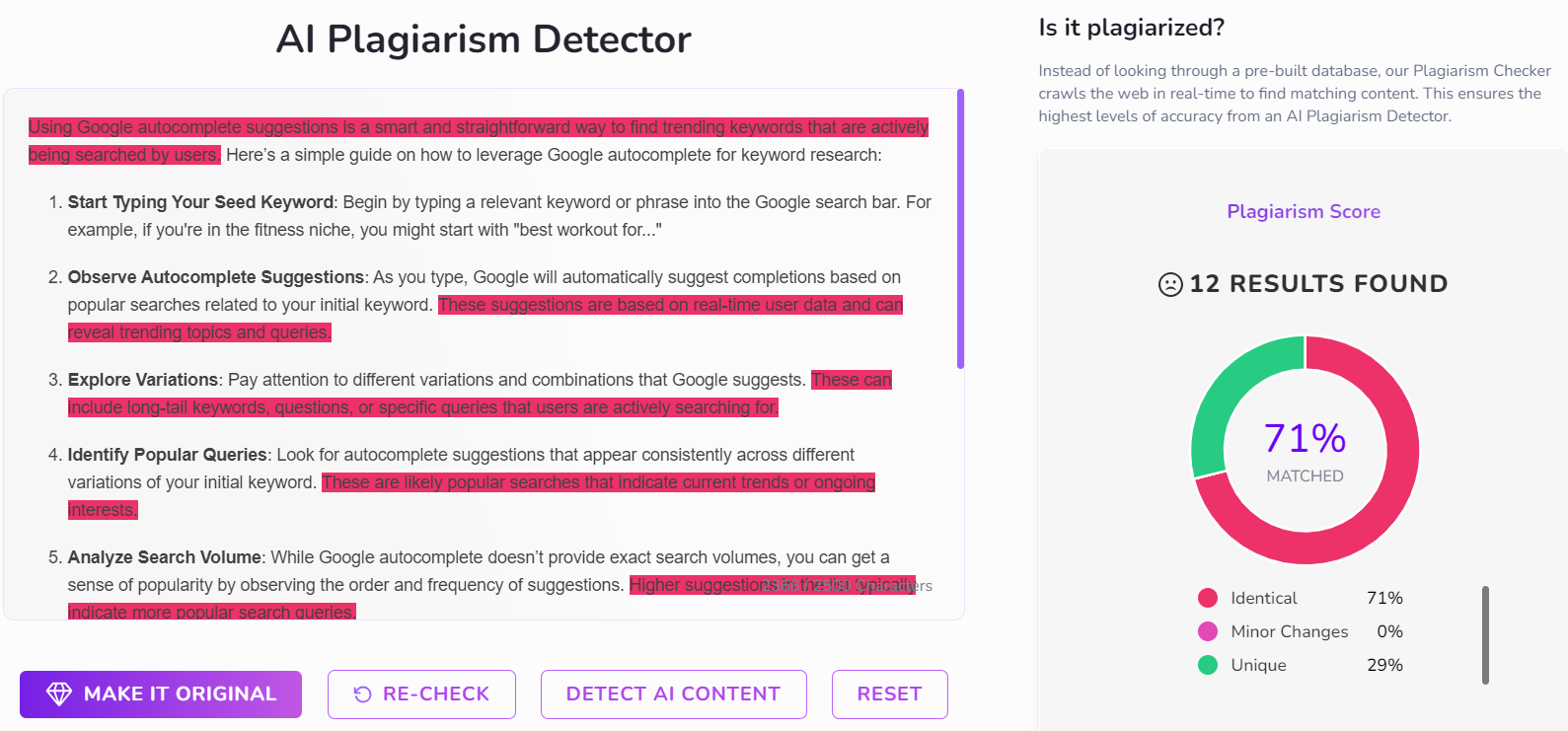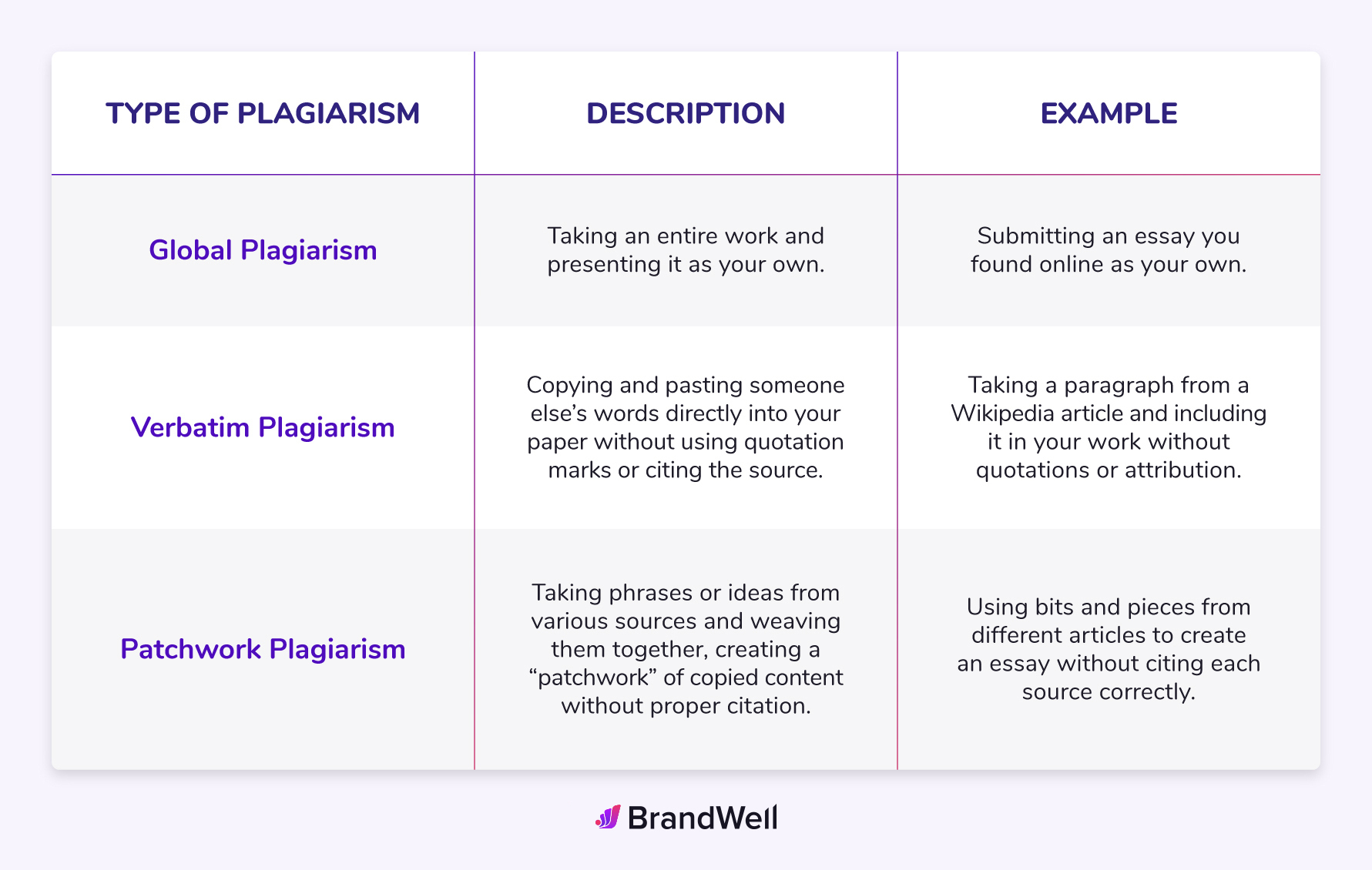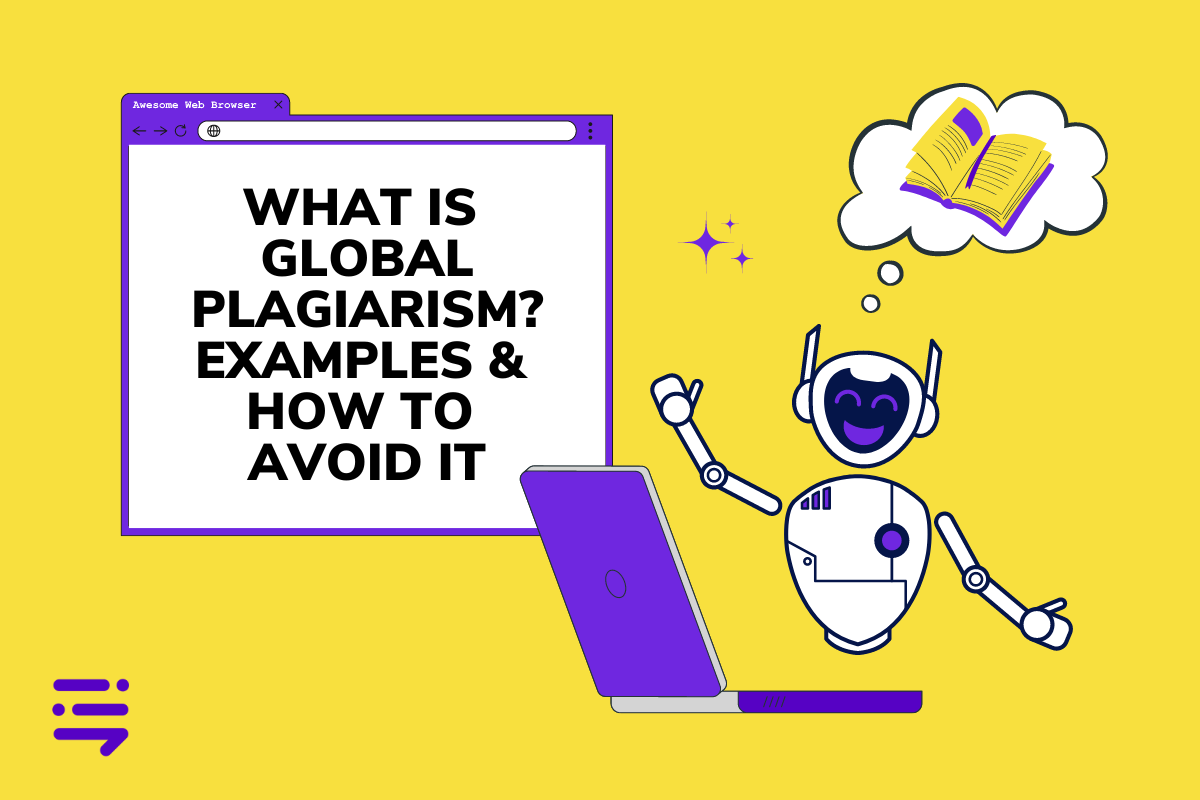Global plagiarism is when you take an entire piece of work, like an essay, article, or even a speech, and pass it off as your own without giving credit to the original author.
This is different from just copying a few sentences or paragraphs — it’s taking someone else’s work in its entirety and slapping your name on it.
In other words, wholesale academic dishonesty.
This could mean downloading an essay from an online paper mill, asking a friend to write your assignment, or even submitting a piece you found on a random website.
No matter its form, global plagiarism is a big no-no in both the academic and professional worlds.
Table Of Contents:
- The Gravity of Global Plagiarism
- Examples of Global Plagiarism
- Why Does Global Plagiarism Happen?
- Avoiding Global Plagiarism: Practical Tips for Students
- Global Plagiarism vs. Other Forms of Plagiarism
- FAQs: What is Global Plagiarism?
- Conclusion
The Gravity of Global Plagiarism
Why is global plagiarism such a big deal?
Well, for starters, it’s downright dishonest.
It’s like taking credit for someone else’s painting, song, or invention — it’s unethical and undermines the principles of academic integrity.
Universities and colleges take this very seriously because it devalues their degrees and the hard work of honest students.
Real-World Consequences
The consequences of global plagiarism can be pretty severe. You can get a failing grade, earn a suspension from school, or even get expelled.
But, it doesn’t stop there.
In the professional world, global plagiarism can tarnish your reputation and even lead to legal troubles.
Imagine getting that dream job only to have it revoked because of a past plagiarism incident from college.
Not a risk worth taking.
Examples of Global Plagiarism
Here are some examples of taking someone else’s entire work and presenting it as your own.
Ghostwriting: A student submits a research paper written by someone else and takes credit for it.
Course Swiping: A professor copies an entire lecture from another professor’s published work without attribution.
Website Content Scraping: A website owner uses automated tools to steal content from another website and publish it on their own, often with minimal changes. This can happen with product descriptions, blog posts, or even entire articles.
YouTube Channel Mimicry: A new YouTuber copies the format, video style, and even jokes of a successful channel, essentially replicating their content entirely.
Social Media Reposting Without Attribution: Sharing someone else’s creative content (like a funny video or infographic) on social media without crediting the original creator is a form of global plagiarism.
Fake News & Misinformation: Websites or social media accounts might steal content from legitimate news sources, but twist the information or headlines to create a false narrative.
Blog Comment Spam: Filling a blog’s comment section with irrelevant or promotional content copied from elsewhere is a minor form of global plagiarism, but it can still be disruptive.
What does global plagiarism look like in the real world?
A musician releases a song that’s a near-identical copy of another artist’s song, resulting in copyright lawsuits (e.g., Robin Thicke’s “Blurred Lines” allegedly copying Marvin Gaye’s “Got to Give It Up”).
A fashion designer copies an entire runway collection from another designer.
A company uses another company’s marketing campaign without permission.
These are just a few examples, and global plagiarism can occur in any field where creative work is produced. It’s important to remember that intellectual property rights exist to protect creators, and global plagiarism is a serious offense with potential legal consequences.
These instances highlight how easy it can be to steal content online. Luckily, there are also tools available to help combat plagiarism, such as plagiarism checkers and copyright detection software.
Why Does Global Plagiarism Happen?
Students might be tempted to plagiarize for many reasons.
Some might be feeling overwhelmed by deadlines, struggling to keep up with their workload, or battling a lack of confidence in their writing.
Whatever the reason, it’s crucial to remember that taking shortcuts only leads to more significant problems down the road.
With the internet bursting with information readily available at our fingertips, avoiding plagiarism can be trickier than ever.
You might wonder, “If I change a few words here and there, it’s not really copying, right?”
Wrong.
Even if you try to disguise it, global plagiarism is still easy to detect, especially with sophisticated plagiarism checker tools.
Avoiding Global Plagiarism: Practical Tips for Students
Now that we’ve established that global plagiarism is a slippery slope, let’s dive into some practical tips to help you steer clear and maintain your academic integrity:
1. Understand What Constitutes Plagiarism
This might seem obvious, but you’d be surprised how many students fall into the trap of unintentional plagiarism.
Make sure you have a firm grasp on what exactly constitutes plagiarism, which includes:
- Submitting someone else’s work as your own
- Copying large portions of text without proper attribution
- Paraphrasing without giving credit to the original source
Remember, even if you’re using online paraphrasing tools or AI writing software, it’s crucial to ensure that the work you’re submitting is genuinely your own.
2. Master the Art of Citation
Think of citations as your way of acknowledging the hard work and research of others.
When you find valuable information in a book, article, or website, always cite it using the citation style preferred by your professor (MLA, APA, Chicago).
This shows that you’re not claiming their ideas as your own.
3. Develop Strong Research and Time Management Skills
Global plagiarism is often a symptom of poor time management and research skills. By developing solid organizational habits, you can avoid last-minute panic and the temptation to plagiarize.
Break down your assignments into smaller, more manageable tasks, and start researching early to allow ample time for reading, note-taking, and formulating your own ideas.
4. Embrace the Rewriting Process
Think of paraphrasing as an opportunity to flex your intellectual muscles and strengthen your understanding of the material.
When you rewrite something in your own words, you’re processing and synthesizing the information on a deeper level, making it less likely that you’ll accidentally plagiarize.
It’s also a great way to develop your unique writing voice.
5. Use a Plagiarism Detector Tool
Think of this scenario: you wrote a paper for your history class about the American Revolution but your professor flagged it for being very similar, almost word for word, to a blog post on the same subject. You must have read the blog post while you were researching and accidentally used some of the same sentences in your paper without realizing it.
A plagiarism detector can help you catch these mistakes before you turn in your work.
Plagiarism checkers like BrandWell act as your safety net. Just paste your text or upload a file to run a plagiarism scan and you’ll immediately get a visual report like this:

From the analysis results and text highlights, you can quickly make revisions to make sure your work is 100% original.
6. Don’t Be Afraid to Seek Help
Remember, you’re not alone on this academic journey. If you’re feeling lost, overwhelmed, or unsure about how to properly cite sources, don’t hesitate to ask for help.
Your professors, teaching assistants, librarians, editors, and writing center staff are all there to support your success. They can help you with research, writing, and citation, ensuring you have the tools to avoid plagiarism.
Global Plagiarism vs. Other Forms of Plagiarism
There are several ways people accidentally commit plagiarism, so understanding these can be helpful.
We already know that global plagiarism involves taking an entire work as your own.
But how does global plagiarism compare to, say, verbatim plagiarism or patchwork plagiarism?

This table highlights the distinctions between global plagiarism and other types of plagiarism, which are often unintentional.
No matter the specific form, plagiarism undermines academic honesty. It’s important to understand and avoid all forms of plagiarism in your academic writing.
FAQs: What is Global Plagiarism?
What is global plagiarism in public speaking?
This occurs when someone presents an entire speech or presentation created by another person.
An example is using a speech you found online or that someone else wrote for you.
Imagine a politician delivering a powerful speech that captivates the nation, only to have it later revealed that they stole the entire speech from a little-known blogger – their reputation would be tarnished.
How to avoid global plagiarism?
The most effective way to avoid global plagiarism is to always create original work.
Conduct thorough research, cite all your sources accurately, and ask your professors for clarification if needed.
Remember, educational institutions use advanced plagiarism checkers to detect all types of plagiarism, even those written in different languages.
What is the difference between verbatim and global plagiarism?
The key difference lies in the amount of copied content. While global plagiarism refers to taking an entire work and claiming it as your own, verbatim plagiarism, or direct plagiarism, involves copying and pasting specific sentences, paragraphs, or even phrases without proper quotation marks or attribution.
Both are serious academic offenses. They reflect dishonesty and a lack of respect for intellectual property.
What is global plagiarism vs. incremental plagiarism?
While both forms are unacceptable, global plagiarism is generally considered more severe as it entails the appropriation of an entire piece of work.
Incremental plagiarism is different. This refers to “borrowing” specific portions — a sentence here, a paragraph there, all without giving due credit.
Think of it this way: imagine copying a few ingredients from a chef’s award-winning recipe — it’s still dishonest, but stealing the whole recipe and claiming it as your own would be a far greater offense, right?
Conclusion
Understanding what is global plagiarism and the severe consequences that come with it is paramount for academic success and a student’s future career.
Remember that plagiarism, in all its forms, can have lasting repercussions.
By committing to ethical writing practices, mastering the art of citation, and using available resources for guidance, you can produce original, well-researched work that truly reflects your academic abilities.




